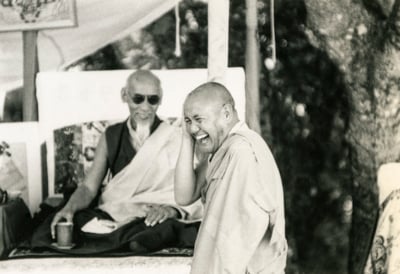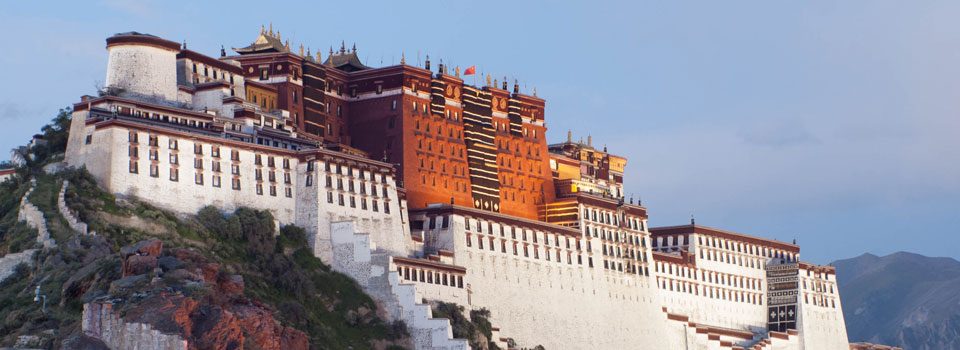| His Holiness Zong Rinpoche came to stay at Kopan Monastery for a few days during the Sixth Meditation Course, March-April 1974. He gave this talk to almost two hundred Western students on April 17. It was translated by Lama Thubten Yeshe and edited by Nicholas Ribush.
Read the transcript of Lama Zopa Rinpoche's teachings from the Sixth Kopan Course on the LYWA website. His Holiness Zong Rinpoche (1905-84) was born in Kham, Tibet, studied at Ganden Monastery, gained renown as a learned geshe and great debater and served as abbot for nine years. He fled to India in 1959 and later served as principal of the Institute for Higher Tibetan Studies in Sarnath. |

[Zong Rinpoche chants]
Rinpoche says that he’s just given you the rlung, or oral transmission, of the Avalokiteshvara mantra, and that there’s a Dharma relationship between all of us from the past; we’ve all known each other before.
Rinpoche says that he’s much attached to Dharma wisdom because he’s been practicing it since he was six or seven years old, and he’s very happy that all of you are acting in accordance with it. However, you should make sure that you’re sincere in trying to understand the Dharma and not just on some trip. His Holiness the Dalai Lama says that he’s seen some people study Buddhism quite deeply but then not put what they have learned into action so that after some time they disappear without an atom of wisdom.
He says he has known Lama Zopa Rinpoche for a long time and although Rinpoche has not had that much time to study, he has something, he knows something that is as valuable as scholarship. He sees what Rinpoche’s doing for you people and thinks it’s beneficial, especially since you have come from so far away, seeking Dharma knowledge-wisdom. It’s difficult but of course, your searching for the Dharma means you have a tremendous level of morality within you, and therefore he’s very glad. But of course, in general, whenever anybody practices Dharma it’s very good.
In particular, those who have renounced samsara in order to put all their energy into the Dharma path are very fortunate to have come to that decision. That’s most worthwhile. And those of you who have taken ordination as monks and nuns—which has been your own decision; nobody else has made you do it—please try to put all your energy into the Dharma path of liberation according to your decision and become continuously successful. That’s really worthwhile.
Lord Buddha himself said that this decision of wanting to take ordination and then keeping your body, speech and mind pure, not harming any other sentient being, is much more beneficial these days than it was in Lord Buddha’s time. In fact, keeping the ordination for one day of this twentieth century is much more beneficial than keeping it for a whole lifetime back then.
Now, you hear many teachings at this meditation course but the main, fundamental thing you need to know is how to take refuge, what the essence of refuge is, what karma is and how it’s created. Those are the main things you need to know. You can’t spend your life sitting in the lotus position meditating. So taking refuge in Buddha, Dharma and Sangha, actualizing your practice continuously and following karma strictly are important. I’m sure Lama Zopa Rinpoche has explained all this and I’m sure you know it too.
The root of what we call Dharma is the mind, your mental attitude, therefore, even if you create negative karma you can purify it; we have the methods for doing that. And also, you should always have pure thoughts and generate a pure motivation, whatever Dharma practices you do. That, too, is important.
We’re always so busy that we don’t have time to meditate every day, but each night, before you go to sleep, you should take refuge, reflect on the excellent qualities of Buddha, Dharma and Sangha, and try to sleep with a pure, positive motivation. In that way your sleep itself becomes Dharma practice and your positive energy automatically increases.
Then, when you get up in the morning, instead of thinking about samsaric things, again think about the good qualities of Buddha, Dharma and Sangha. So in the morning, get up, make three prostrations, take refuge in Buddha, Dharma and Sangha and generate a pure motivation for whatever you’re going to do that day. This is very important and worthwhile since you can’t practice perfect single-pointed concentration because of your busy life. If you do this continuously every morning it will be very effective in helping you integrate every day of your life with Dharma knowledge-wisdom.
Of course, life is difficult—it’s hard not to create any negative actions—but there’s a solution. You can purify them with understanding knowledge-wisdom. So instead of being discouraged, thinking, “Oh, I can’t do anything; I’m so negative,” know that knowledge-wisdom is a powerful antidote to negativity and stop feeling sorry for yourself and hanging onto your old habits and uncontrolled energy. So make a strong effort to purify your negativities with wisdom.
I know it’s hard for you to practice only Dharma and not engage in any samsaric activity, but try as much as you can to do some of the things we’re doing here, such as prayers, mantras and so forth. Do your best to bring Dharma wisdom into whatever situation you’re in and, slowly, slowly, you’ll continuously develop. Then, even if you don’t reach levels of perfection in this life, there’s hope that you might do so in the next. It’s possible.
Another thing is that rather than hating people who practice Dharma you should be glad and rejoice in their actions. Sometimes your friend might do something good, some meditation or something, and you look at him sideways, “Hmm….” Instead of being jealous, be happy. That, too, is very important. It becomes wisdom.
Remember how Lord Buddha spent years actualizing knowledge-wisdom while he was on the path to enlightenment and finally gained perfect liberation, and be happy; rejoice instead of feeling hatred. Doing so creates the cause for you to also reach that level.
Similarly, when you see people reciting mantras, doing prostrations—there are many different ways of actualizing Dharma knowledge-wisdom—instead of looking at them funny, “What’s she doing, why is she trying to be different?” try to feel glad. Or when you see somebody who has taken ordination trying to keep his or her body, speech and mind pure, instead of feeling dislike and jealousy, rejoice that the person is trying to do something positive.
When you rejoice at others’ positive actions you also create merit. That’s better than looking critically at what others do and putting them down, thinking they’re just trying to be different. When you rejoice at others’ positive actions you generate positive energy within yourself. And not only at others’ positive actions—you can also rejoice at your own positive actions. Be happy that you have found the chance to gain Dharma wisdom, which is very difficult to find. It’s not easy to have the opportunity to open your mind, develop awareness and discover the true nature of your internal world. This truly is most difficult.
You can see this for yourself. Look at the members of your own family and the people in your own country and abroad. It’s extremely difficult to come to the conclusion that it’s important to search for the inner truth and develop knowledge-wisdom. So feel that you are very, very fortunate to have come to that conclusion yourself—when you do, that itself increases the energy of your Dharma wisdom.
During the meditation course you might sometimes feel that developing Dharma wisdom is difficult but try not to think that way and feel fortunate instead. Of course, when you practice Dharma problems might arise but instead of thinking, “This is a problem, this is bringing me down,” try to make it a positive experience. Transforming negative experiences into Dharma wisdom is very important.
We think, “I’m suffering, I’m agitated,” but if you really look at this agitated life you’ll see how short it is. When actualizing Dharma wisdom on the path to liberation it’s natural for samsaric problems to arise; you have to expect them. But this life itself is short, transitory and illusory and you should not be attached to samsaric happiness, which lasts just a day or two. There’s no point clinging to that and it really doesn’t matter whether you’re samsarically happy or sad; it doesn’t matter. Rather than being up and down all the time, you’re better off continuously actualizing Dharma wisdom.
When everything’s going well you say, “Oh, I like practicing Dharma,” but when you encounter problems you say, “It’s too hard.” Some little problem arises, perhaps with a friend, you’re up and down, and for that small reason your practice suffers. You shouldn’t let small samsaric agitation upset you; your wisdom should be stronger than that and you should not so easily lose energy and give up your practice. That’s wrong.
Rinpoche says that he has had contact with us before and we have met this time in order to develop Dharma wisdom, not simply for this life’s happiness. Similarly, you’re taking this meditation course because of your tremendous past connections with Lama Zopa Rinpoche; there’s a strong karmic link between his energy and yours and you’re extremely fortunate to have that contact. It hasn’t happened accidentally or because of something that happened just last year.
He also says that he’s glad that you can see the possibility of actualizing the path to everlasting peaceful liberation and is happy to be able to talk to you for this short time. He feels he doesn’t have to explain too much because Lama Zopa Rinpoche is doing that and there’s much you know already.
So, please actualize what you know and feel is worthwhile, and he will pray for you to continuously actualize knowledge-wisdom on the path to liberation. Thank you so much.
